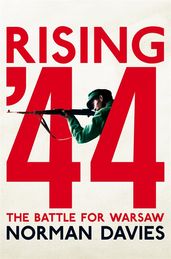Synopsis
In this brilliant narrative of the Warsaw Uprising, British historian Norman Davies offers a stirring account of one of the defining moments of the 20th century.
1944. WWII was tearing Europe apart. To the Wehrmacht, Nazi-occupied Warsaw represented the the last line of defence against the advancing Red Army. So, when the Red Army reached the river Vistula, the people of Warsaw believed that liberation had come. The city waited for salvation. Little did it know, it was in the eye of a storm.
Instead of liberating, the Soviets remained where they were, allowing the Wehrmacht time to regroup and Hitler to order that the city of Warsaw be razed to the ground. For 63 days the Resistance fought on in the cellars and the sewers. Defenceless citizens were slaughtered in their tens of thousands. One by one the city's monuments were reduced to rubble, watched by Soviet troops on the other bank of the river.
Vividly and authoritatively told by one of our greatest historians, Rising '44 is the poignant narrative of Warsaw's 63 days.
Details
Reviews
[His] knowledge and his passion are displayed in this notable book. His research among Polish and Soviet sources is exhaustive
Davies reveals a comprehensive design, tremendous narrative power, a remarkable gift for compression, and a shrewd sense of overall balance
Davies has been widely recognised as the historian of that benighted country. Now he has used the forthcoming 60th anniversary of the uprising not only to provide a comprehensive account but to make us rethink the central trauma of the 20th century - the conflict between democracies and the totalitarian fantasies of fascism and communism.
Much more than the story of the Warsaw uprising. It is one of the most savage indictments of Allied malfeasance yet leveled by a historian. Unsparing in his depictions of the slaughter of the Polish fighters and the destruction of their capital, Davies challenges the popular assumption that World War II was entirely the triumph of good over evil.



